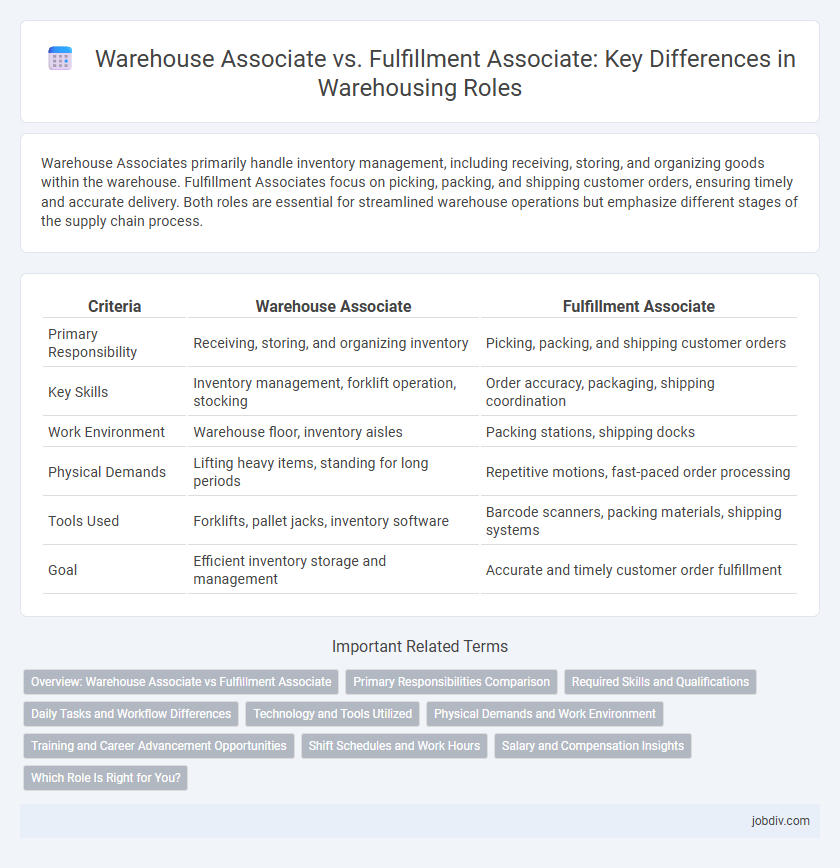Warehouse Associates primarily handle inventory management, including receiving, storing, and organizing goods within the warehouse. Fulfillment Associates focus on picking, packing, and shipping customer orders, ensuring timely and accurate delivery. Both roles are essential for streamlined warehouse operations but emphasize different stages of the supply chain process.
Table of Comparison
| Criteria | Warehouse Associate | Fulfillment Associate |
|---|---|---|
| Primary Responsibility | Receiving, storing, and organizing inventory | Picking, packing, and shipping customer orders |
| Key Skills | Inventory management, forklift operation, stocking | Order accuracy, packaging, shipping coordination |
| Work Environment | Warehouse floor, inventory aisles | Packing stations, shipping docks |
| Physical Demands | Lifting heavy items, standing for long periods | Repetitive motions, fast-paced order processing |
| Tools Used | Forklifts, pallet jacks, inventory software | Barcode scanners, packing materials, shipping systems |
| Goal | Efficient inventory storage and management | Accurate and timely customer order fulfillment |
Overview: Warehouse Associate vs Fulfillment Associate
Warehouse Associates manage inventory storage, organization, and material handling within a facility to ensure efficient warehouse operations. Fulfillment Associates specialize in processing customer orders, picking, packing, and preparing shipments for delivery. Both roles are critical in supply chain logistics, with Warehouse Associates focusing on stock management and Fulfillment Associates emphasizing order accuracy and timely dispatch.
Primary Responsibilities Comparison
Warehouse Associates primarily handle inventory management, including receiving, storing, and organizing products within the warehouse to maintain accurate stock levels and efficient space utilization. Fulfillment Associates focus on order processing tasks such as picking, packing, and shipping products to ensure timely and accurate delivery to customers. Both roles require attention to detail and adherence to safety protocols but differ in their core focus on inventory control versus order fulfillment.
Required Skills and Qualifications
Warehouse Associates require strong organizational skills, proficiency in inventory management software, and the ability to operate forklifts and pallet jacks safely. Fulfillment Associates need expertise in order picking, packing accuracy, and familiarity with barcode scanning technology for efficient processing of customer orders. Both roles demand physical stamina, attention to detail, and effective communication skills to ensure smooth warehouse operations.
Daily Tasks and Workflow Differences
Warehouse Associates primarily handle inventory management, including receiving, storing, and organizing products, while Fulfillment Associates focus on order processing, picking, packing, and shipping customer orders. Daily tasks for Warehouse Associates involve stock replenishment, quality checks, and maintaining warehouse safety, whereas Fulfillment Associates prioritize accuracy and speed in assembling orders for dispatch. Workflow differences stem from Warehouse Associates supporting upstream logistics operations and Fulfillment Associates driving downstream customer order fulfillment.
Technology and Tools Utilized
Warehouse Associates primarily use inventory management systems, barcode scanners, and forklifts to efficiently handle storage and retrieval of goods within warehouses. Fulfillment Associates leverage order processing software, automated packing machines, and conveyor systems to ensure accurate and speedy order completion. Both roles increasingly integrate warehouse management systems (WMS) and RFID technology to enhance accuracy, reduce errors, and improve overall operational efficiency.
Physical Demands and Work Environment
Warehouse Associates often engage in repetitive lifting, bending, and standing for extended periods in large, climate-controlled facilities, requiring physical stamina and strength to handle heavy pallets and inventory with equipment such as forklifts. Fulfillment Associates typically work in fast-paced environments, focusing on order picking and packing with frequent walking, reaching, and manual dexterity while maintaining accuracy under time constraints. Both roles demand adherence to safety protocols and adaptability to varying temperature conditions depending on the warehouse type and goods stored.
Training and Career Advancement Opportunities
Warehouse Associates receive foundational training in inventory management, equipment operation, and safety protocols, which equips them for roles in stock replenishment and order picking. Fulfillment Associates often undergo specialized training in order processing technologies, packing accuracy, and shipping coordination, positioning them for advancement in logistics and supply chain management. Career growth for Warehouse Associates typically leads to supervisory roles, while Fulfillment Associates may advance into roles such as fulfillment coordinators or logistics analysts.
Shift Schedules and Work Hours
Warehouse Associates typically work fixed shifts ranging from 8 to 12 hours, often including overnight or early morning hours to accommodate inventory management and restocking activities. Fulfillment Associates frequently have more variable schedules, with shifts that may span mornings, evenings, or weekends to meet peak order processing demands. Both roles may require overtime during high-volume periods, but Warehouse Associates usually maintain more consistent daily hours compared to the fluctuating schedules of Fulfillment Associates.
Salary and Compensation Insights
Warehouse Associates typically earn between $28,000 and $38,000 annually, with variations based on location and experience, while Fulfillment Associates tend to receive slightly higher compensation, ranging from $30,000 to $42,000 per year due to the additional responsibilities in order processing and packaging. Performance bonuses, shift differentials, and overtime pay can further enhance total earnings for both roles, but Fulfillment Associates often have more opportunities for incentives tied to speed and accuracy metrics. Understanding these salary ranges helps employers tailor competitive compensation packages that attract and retain skilled candidates in warehousing operations.
Which Role Is Right for You?
Warehouse Associates primarily focus on inventory management, including receiving, storing, and organizing products within the warehouse environment. Fulfillment Associates specialize in picking, packing, and shipping customer orders accurately and efficiently to ensure timely delivery. Choosing the right role depends on your preference for either behind-the-scenes inventory tasks or direct involvement in the order fulfillment process.
Warehouse Associate vs Fulfillment Associate Infographic

 jobdiv.com
jobdiv.com